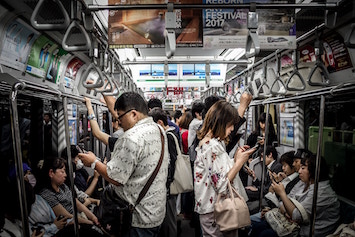August 10, 2018
By Nina Schroder, MSW, LCSW
 Smartphones have transformed modern life in more ways than anyone could have imagined. They enable 24/7 access to infinite information and tools that help us stay organized, track our fitness, express ourselves and be entertained. However, easy access to these digital devices and their habit-forming qualities has led to high screen time for both children and adults and emerging research suggests that such high screen use can have a negative impact on mental health.
Smartphones have transformed modern life in more ways than anyone could have imagined. They enable 24/7 access to infinite information and tools that help us stay organized, track our fitness, express ourselves and be entertained. However, easy access to these digital devices and their habit-forming qualities has led to high screen time for both children and adults and emerging research suggests that such high screen use can have a negative impact on mental health.
Since the rise of the smartphone, indicators of mental “wellness” such as happiness, self-esteem and life satisfaction have decreased while serious mental health issues like anxiety, depression, loneliness and suicide have increased significantly, particularly among young people. A possible reason for this might be that more time on screens, particularly social media, leads to increased risks of stressors like social isolation, cyberbullying, social comparison, decreased life satisfaction, reduced productivity and distraction from personal values and goals.
Increased time on screens also means there’s less time available for positive real world experiences that promote mental health, like exercise, quiet reflection and quality, in-person social connection. With all of this in mind, it’s not surprising that research suggests that less time on social media leads to better well-being.
While more research is needed, it certainly appears that less screen time bodes well for mental health. So, consider the following tips to keep screen time in-check, leaving more room for healthy, positive real-world experiences.
Despite opportunities for online “connection,” loneliness is at an all-time high. Indeed, quality face-to-face social connection is critical to mental wellness. So, make it a goal to have screen-free, in-person social connections with friends, co-workers and loved ones on a daily basis. Consider making it a standard to power down whenever there is an opportunity for conversation such as in the car, standing in line and during meals or social gatherings.
Screen time within an hour of bedtime can negatively impact sleep, which can contribute to physical, mental and cognitive issues. However, the lure of a screen in a quiet bedroom is hard to resist. It’s difficult to ignore texts, resist a Netflix binge or mindlessly scroll through social media. Eliminate the temptation by keeping phones out of the bedroom entirely and reach for a book or magazine instead.
Put away your phone when you need to focus on a task, particularly related to school or work. Research on multitasking shows that it causes distraction, reduces productivity and increases errors. One study showed that subjects whose phones were in a different room performed better on a cognitive test compared to those whose phones were in front of them—and set on “Silent” mode. In addition to reduced productivity and cognitive impact, media multitasking also has been linked to lower wellbeing.
Ask yourself if being on your phone is what you really want to be doing at that moment. By using mindfulness, you can identify if you’re trying to avoid negative feelings or a necessary task, or whether you’re truly enjoying your digital experience. This exercise can help with getting in touch with your emotions and improve purposeful decision-making around screen use.
Making time for hobbies or activities that promote health, personal growth or connections with others can help to reduce screen use and provide a sense of meaning and purpose. Some examples are: reading books, hiking in nature, taking mindful walks, prayer or meditation, joining a club, practicing yoga, cooking, volunteering or learning to play an instrument.
A daily practice in quieting your mind and counting your blessings can boost positive emotion and improve psychological wellness. Research suggests that gratitude may protect against social comparison and envy—common experiences with social media. Reflect on what is good and right in your life. During quiet, screen-free time, write down five good things from each day. Savor simple pleasures like a sunny day, a good cup of coffee or a friendly exchange with someone.
Take time to mindfully consider what you value most in life. What do you want your life to be about? Quality relationships? Physical and emotional health? Spiritual growth? Professional growth? Regularly consider whether screen use is moving you toward or away from your values. If you notice that your screen use is moving you in an unwanted direction, give yourself grace, hit the figurative “reset” button and get back on track.
Nina Schroder, MSW, LCSW is a mental health therapist at Virginia Commonwealth University in Richmond, VA. She specializes in the treatment of anxiety and depression and researches the effects of high screen use on mental health, emotional resilience, and overall wellness. Nina is passionate about helping others increase wellness and emotional resilience in the Digital Age and delivers lectures and workshops both locally and nationally. You can reach her at [email protected].
We’re always accepting submissions to the NAMI Blog! We feature the latest research, stories of recovery, ways to end stigma and strategies for living well with mental illness. Most importantly: We feature your voices.
LEARN MORENAMI HelpLine is available M-F, 10 a.m. – 10 p.m. ET. Call 800-950-6264,
text “NAMI” to 62640, or email. In a crisis, call or text 988 (24/7).